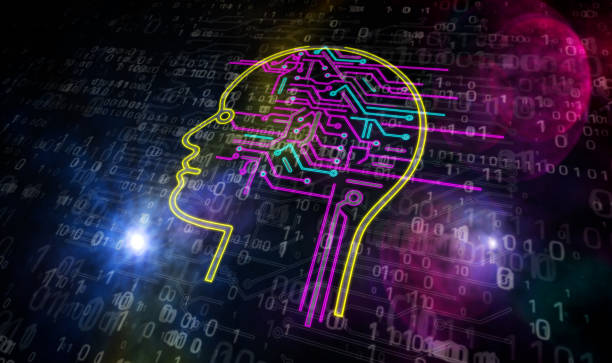What is Artificial Intelligence? Definition and Basic Concepts
Artificial Intelligence or AI is a branch of computer science that deals with building machines capable of thinking and learning like humans.
These machines are capable of performing tasks that usually require human intelligence, such as pattern recognition, problem solving, decision-making, and learning.
In fact, the main goal of artificial intelligence is to create systems that can interact with their environment and solve problems independently and without human intervention.
#Machine_Learning is one of the main subsets of artificial intelligence that focuses on training machines through data.
Key concepts in artificial intelligence include algorithms, neural networks, big data, and deep learning.
Algorithms are a set of instructions that machines follow to perform tasks.
Neural networks are models inspired by the structure of the human brain and are used for pattern recognition and learning from data.
Big data also plays a vital role in training machines, because the more data is available, the better machines can learn and perform.
Artificial intelligence is currently used in various industries, including healthcare, automotive, finance, and marketing, and is predicted to play an even more important role in our lives in the future.
Are you losing your business opportunities because of an old website? With Rasaweb, solve the problem of not attracting potential customers through your website forever!
✅ Attract more high-quality leads
✅ Increase brand credibility in the eyes of customers
⚡ Get free consulting for corporate website design
History of Artificial Intelligence from Beginning to Today
The history of artificial intelligence dates back to the 1950s, when scientists and researchers first considered the idea that machines could be built with the ability to think.
One of the important milestones in this period was the creation of the “Checkers Player” program by Arthur Samuel, which showed that machines can learn from experience.
In the following decades, significant advances were made in algorithms and hardware, but artificial intelligence also faced challenges, including a lack of data and computational limitations.
In recent decades, with the emergence of big data and dramatic advances in computer processing power, artificial intelligence has regained attention.
Deep learning techniques, which use complex neural networks, have achieved impressive results in areas such as image recognition, natural language processing, and computer games.
Today, artificial intelligence is developing rapidly and is changing the way we live and work.
Modern applications include self-driving cars, virtual assistants, and recommendation systems.
Types of Artificial Intelligence: Approaches and Classifications
Artificial intelligence can be divided into different categories, including Narrow AI, which specializes only in a specific area, General AI, which has the ability to do anything that a human can do, and Super AI, which surpasses human intelligence.
Most of the artificial intelligence systems used today are of the Narrow AI type and are designed to perform specific tasks.
There are different approaches to developing artificial intelligence, including the Symbolic AI approach, which focuses on using symbols and logical rules to represent knowledge, and the Connectionist AI approach, which focuses on using neural networks to learn from data.
Each of these approaches has its own advantages and disadvantages, and the choice of the appropriate approach depends on the type of problem and the available data.
Currently, machine learning and deep learning are among the most popular approaches in artificial intelligence development.
These techniques allow machines to automatically learn from data and improve their performance.
For example, image recognition systems that use deep learning can recognize images with very high accuracy and are used in areas such as facial recognition, medicine, and agriculture.
Click here to preview your posts with PRO themes ››
Applications of Artificial Intelligence in Various Industries
Artificial intelligence currently has widespread applications in various industries.
In the field of healthcare, artificial intelligence can help doctors diagnose diseases, design personalized treatments, and discover new drugs.
In the automotive industry, self-driving cars use artificial intelligence algorithms for safe and efficient driving.
In the financial field, artificial intelligence can help banks and financial institutions detect fraud, manage risk, and provide better customer service.
In the retail industry, recommendation systems use artificial intelligence to suggest related products to customers, and in the manufacturing industry, robots equipped with artificial intelligence can perform repetitive and dangerous tasks.
In addition, artificial intelligence has important applications in other areas such as education, agriculture, energy, and entertainment.
In education, intelligent educational systems can help students learn in a personalized way, and in agriculture, artificial intelligence can help farmers manage their products better and increase productivity.
In general, artificial intelligence has the potential to create huge transformations in various industries and help improve the quality of human life.
Are you disappointed with the low conversion rate of your online store?
Rasaweb, with its professional online store design, is your definitive solution!
✅ Increase your sales and revenue
✅ Unique user experience for your customers
⚡ Get free consultation now!
Advantages and Disadvantages of Artificial Intelligence: Opportunities and Challenges
Artificial intelligence has many advantages, including increased productivity, reduced costs, improved accuracy and speed, and new opportunities for innovation.
However, artificial intelligence also has challenges, including concerns about job loss, discrimination in algorithms, and ethical issues related to privacy and data security.
To fully exploit the potential of artificial intelligence, these challenges must be addressed seriously and solutions must be provided to reduce their negative effects.
Training and preparing the workforce for new jobs created by artificial intelligence is an important solution to deal with job loss.
Also, developing transparent and reliable algorithms and formulating appropriate laws and regulations for the use of artificial intelligence can help reduce discrimination and protect privacy.
In general, artificial intelligence is a powerful technology that can help solve many global problems, but for responsible and ethical use of it, we must pay enough attention to the related issues.
Machine Learning and Deep Learning: Concepts and Differences
Machine learning and deep learning are two important subsets of artificial intelligence that allow machines to learn from data and improve their performance.
Machine learning includes algorithms that can extract patterns from data and make accurate predictions.
Deep learning, which is a subset of machine learning, uses complex neural networks to learn from data.
The main difference between machine learning and deep learning is that deep learning can automatically extract important features from data, while in machine learning, features must be manually defined by humans.
Deep learning, due to its ability to learn complex features from data, has achieved impressive results in areas such as image recognition, natural language processing, and speech recognition.
However, deep learning requires a lot of data and may take a long time to train.
Machine learning algorithms are still used in many fields and can be trained using less data and in a shorter time.
The Future of Artificial Intelligence: Predictions and Trends
The future of artificial intelligence looks bright, and it is predicted that huge transformations will take place in this field in the coming years.
One of the important trends in artificial intelligence is the development of general artificial intelligence systems that can have the ability to do anything that a human can do.
Also, significant advances are being made in the field of Explainable AI, which allows machines to explain their decisions in a transparent and understandable way.
This can help increase trust in artificial intelligence and its wider use.
Click here to preview your posts with PRO themes ››
In addition, artificial intelligence is merging with other technologies such as the Internet of Things (IoT), blockchain, and cloud computing, and this can lead to the creation of innovative and more efficient solutions.
In general, artificial intelligence has the potential to become one of the most important technologies of the 21st century and help solve many global problems.
Artificial Intelligence Development Tools: Introduction and Review
For the development of artificial intelligence, various tools are available, each with its own features and capabilities.
TensorFlow and PyTorch are two popular frameworks for machine learning and deep learning that have been developed by Google and Facebook.
These frameworks provide the ability to create and train complex neural networks.
Scikit-learn is a Python library that includes various machine learning algorithms and is used for data analysis and building predictive models.
Keras is a high-level user interface for TensorFlow and PyTorch that makes it easier to develop deep learning models.
In addition, cloud services such as Amazon SageMaker, Google Cloud AI Platform, and Microsoft Azure Machine Learning provide access to computing resources and artificial intelligence development tools.
These services help developers quickly and easily create, train, and deploy artificial intelligence models.
Choosing the right tool depends on the type of project, the developer’s skills, and the available resources.
Does your company’s website make a professional and lasting first impression on potential customers? Rasaweb, with its professional corporate website design, not only represents the credibility of your brand, but also opens a path for the growth of your business.
✅ Create a powerful and reliable brand image
✅ Attract target customers and increase sales
⚡ Get free consultation
Ethical Issues of Artificial Intelligence: Privacy, Discrimination, and Responsibility
Artificial intelligence raises important ethical issues that must be addressed.
One of these issues is privacy.
Artificial intelligence systems are often used to collect and analyze personal data, and this can lead to violations of individuals’ privacy.
To protect privacy, appropriate laws and regulations must be developed for the collection and use of personal data, and artificial intelligence systems must be designed in such a way as to protect users’ privacy.
Another issue is discrimination in algorithms.
Artificial intelligence algorithms may be trained based on historical data that includes existing discrimination in society.
This can lead to the creation of systems that act discriminatorily.
To prevent discrimination, training data must be carefully reviewed and fair algorithms must be used.
The issue of responsibility is also another important issue.
If an artificial intelligence system makes a mistake and causes damage, who will be responsible? To answer this question, appropriate laws and regulations must be developed to determine responsibility in the event of an error.
How to Learn Artificial Intelligence? Resources and Educational Paths
Learning artificial intelligence requires basic knowledge in computer science, mathematics, and statistics.
To get started, you can use free or paid online courses.
Coursera, edX, and Udacity are platforms that offer various courses in the field of artificial intelligence.
Also, textbooks and scientific articles are also useful resources for learning artificial intelligence.
To gain practical experience, you can participate in open source projects or create your own personal projects.
Click here to preview your posts with PRO themes ››
There are different educational paths for learning artificial intelligence.
You can focus on machine learning, deep learning, natural language processing, or robotics.
Choosing the right path depends on your interest and goal.
Also, attending conferences and training workshops can help you learn about the latest advances in artificial intelligence and connect with experts in the field.
Artificial intelligence is a dynamic and evolving field, and to succeed in this field, you must constantly update your knowledge.
Frequently Asked Questions
| Question | Answer |
|---|---|
| What is the definition of Hoosh Masnooei (Artificial Intelligence)? | It is a field in computer science that aims to create intelligent machines that can think, learn, solve problems, and make decisions like humans. |
| Mention some common applications of artificial intelligence. | They include self-driving cars, voice assistants (such as Siri and Alexa), recommendation systems (such as Netflix and Amazon), facial recognition, and medical diagnosis. |
| What is the difference between Narrow AI (ANI) and General AI (AGI)? | Narrow AI specializes in one specific task, while General AI possesses human-like intellectual ability to perform any cognitive task. |
| What is Machine Learning and its relation to Artificial Intelligence? | Machine learning is a branch of artificial intelligence that focuses on developing algorithms that allow systems to learn from data without explicit programming. |
| What are Artificial Neural Networks? | They are computational models inspired by the structure and function of the human brain, and are used in deep learning to process data and discover complex patterns. |
| Mention some ethical challenges related to artificial intelligence. | They include issues of privacy, bias in data and algorithms, job losses, and responsibility in case of errors or unfair decisions. |
| What is Natural Language Processing (NLP)? | It is a branch of artificial intelligence that focuses on enabling computers to understand, interpret, and generate human language in a useful and interactive way. |
| How can artificial intelligence affect the labor market? | It can lead to the automation of some routine tasks, requiring the retraining of workers and creating new jobs in the fields of design, development, and maintenance of artificial intelligence systems. |
| What is Computer Vision? | It is a field in artificial intelligence that enables computers to “see”, understand, and interpret images and videos in the same way that humans do, enabling them to recognize objects and faces. |
| What is the importance of data in the development of artificial intelligence systems? | Data is the fuel that feeds artificial intelligence systems, especially in machine learning. The quality and quantity of data greatly affect the accuracy and performance of models and their ability to learn and make correct decisions. |
And other services of Rasa Web Advertising Agency in the field of advertising
Intelligent Content Strategy: A combination of creativity and technology to increase website traffic by managing Google Ads.
Intelligent Digital Branding: Designed for businesses looking to build digital brands through intelligent data analysis.
Intelligent Sales Automation: A professional solution to increase click-through rates with a focus on using real data.
Intelligent Website Development: A fast and efficient solution to increase website traffic with a focus on designing an attractive user interface.
Intelligent Data Analysis: A fast and efficient solution for digital branding with a focus on designing an attractive user interface.
And more than a hundred other services in the field of internet advertising, advertising consulting and organizational solutions
Internet Advertising | Advertising Strategy | Advertorial
Resources
Introduction to Artificial Intelligence and its Applications
,What is Artificial Intelligence and How Does it Work?
,














